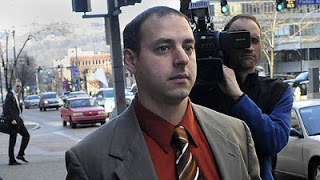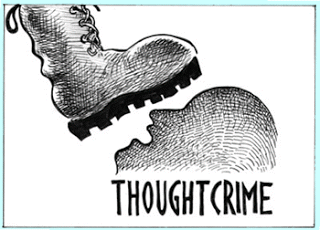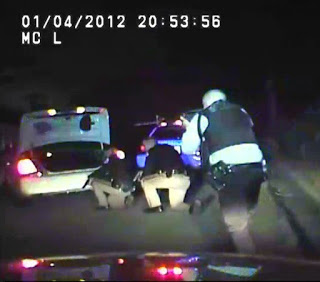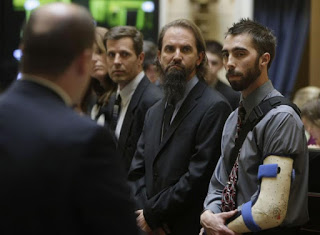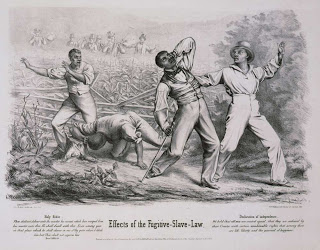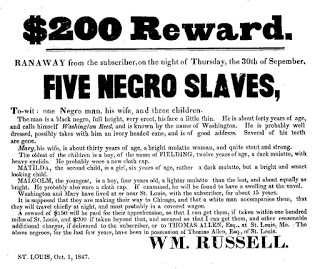If resisting arrest
is a crime, does a woman have the right to resist a sexual assault by a police
officer?
Last May 5th, Magdelena
Mol, a young wife and mother from Burbank, Illinois, went to a nearby village
called Justice to visit a friend. Shortly after midnight, Mrs. Mol called a
taxi and went to a street corner to wait for her ride. A few minutes later, a
police officer named Carmen Scardine drove by, then stopped in the middle of
the street and ordered Mol to get into his car.
Although Scardine demanded
identification from Mol and called the dispatcher to run her name, he never explained
why he had taken her into custody. When the taxi arrived a few minutes later,
the officer ordered the driver to leave. He then drove the terrified young
woman to a secluded area and sexually assaulted her.
On the following day,
Mrs. Mol filed an official complaint, which was upheld by the Justice Police
Department. She
has filed a lawsuit against the department and the Village of Justice – but
there is no record that Scardine has been charged with a crime, or even
subjected to official discipline.
“As far as I know,
he’s still on the force,” stated a dispatcher for the Village of Justice Police
Department (which is no stranger
to corruption) when asked about Carmen Scardine’s status on November 21.
The facts asserted by
Mrs. Mol in her lawsuit aren’t in dispute. Why wasn’t her assailant prosecuted
for sexual assault? If Scardine had been charged with that crime, he may have been
able to claim that the victim had consented to the act – because she didn’t
resist. Of course, if she had
resisted, she most likely would have been prosecuted for resisting arrest or
even aggravated assault on a police officer – assuming that the victim survived
the officer’s attempts to “subdue” her.
Pittsburgh resident
Sarah Smith had an experience very similar to that of Magdelena Mol. One
morning several years ago, Smith was in a minor traffic accident with a man on
a motorcycle. Smith had let her liability insurance lapse, and she was driving
on an expired license, so she was probably already in a state of panic when
Pittsburgh Police Officer Adam Skweres arrived. Smith’s unease catalyzed into
terror when the officer pulled her aside and offered to let her traffic
violations slide as part of a carnal transaction.
Officer
Skweres told Smith that "he could make it look like [the accident] was my
fault or he could give the driver a ticket for failure to obey signs," she
recalled in an interview with the Pittsburgh Post-Gazette. The price of a
favorable assessment would take the form of unspecified sexual favors, and
Skweres quite generously promised that what he would demand of Smith would not
be "as bad as what would happen to me in jail." Such a deal!
On
the other hand, if Smith put up a fight, Skweres warned, she would be arrested
for resisting arrest, handcuffed, and then raped in the back seat of the police
car. Before the officer could make good on his threat, the situation changed,
and he agreed to let the terrified young woman go -- but only after gesturing
to his gun and warning her that "If you say anything about this I'll make
sure you never walk, talk, or breathe again."
Smith
reported the incident to the Pittsburgh Police Bureau. Complaints were filed by two other women endured nearly identical threats from Skweres
(one of whom, a woman embroiled in a child custody dispute, was told that she
could purchase a favorable recommendation to the child welfare bureaucracy in
exchange for oral sex). The uniformed predator was allowed to continue
patrolling the streets -- and to collect his $57,000 annual salary – until last
February 17, when he was
arrested for sexually assaulting a young woman in her home six days earlier.
The
victim in the February 11 assault was a woman whose boyfriend was in jail.
After asking the victim if she was wearing a wire, and turning on the kitchen
faucet to conceal any potentially incriminating noises, Skweres explained the
nature of the transaction: He would "help" her boyfriend in exchange
for sex. After forcing the traumatized woman to service him, the cop cleaned
himself up with a paper towel and left.
Skweres
was as predictable as he was persistent. Last December, he had paid a similar
visit to Melissa Watkins, whose boyfriend was also in jail. She was alone with
her young daughter when the cop materialized to proposition her.
"He
locked my front door and everything, he said, `so no one could bother
us,'" Watkins told the Post-Gazette. Unzipping his uniform
trousers, Skweres offered the same arrangement: He would "help"
Watkins' boyfriend in consideration of sexual services. Watkins -- despite
being utterly terrified -- refused.
"There's
a man with a badge and a gun in front of you, trying to proposition you,"
she recalled. "You don't know which way it's going to go."
Four alleged victims have testified against Skweres in a
preliminary hearing last March. Since that time, a fifth woman has filed a criminal complaint against him. While he refuses to
characterize his accusers as liars, the former police officer insists
that he always carried out his duty “with integrity and honesty” and maintains
that he is “absolutely” innocent of the charges against him.
Displaying
the capacity for self-preoccupation typical of the tax-feeding class, Skweres protested that his arrest and
prosecution have “turned my life upside down.” An Army reservist who served in
Iraq, Skweres was initially rejected by the police academy when a psychologist
found him unsuited to police work, but he was awarded a slot following an
appeal to the civil service commission. Reports of his predatory behavior began
surfacing about eighteen months after Skweres joined the force.
As
of 2008, there
were roughly 600,000 state and local police officers in the United States.
If former Seattle Police Chief Norm Stamper is correct, at least 30,000 of them
are active sexual predators.
On-duty
sexual predation by police officers “happens far more often than people in the
business are willing to admit,” Stamper warns in his memoir Breaking
Rank: A Top Cop's Expose of the Dark Side of American Policing. “My cautious guess
is that about 5 percent of America's cops are on the prowl for women. In a
department the size of Seattle's that's sixty-three police officers. In San
Diego [where Stamper began his police career], 145. In New York City, 2,000.
The average patrol cop makes anywhere from ten to twenty unsupervised contacts
a shift. If he's on the make, chances are a predatory cop will find you. Or
your wife, your partner, your daughter, your sister, your mother, your friend."
The
targets of opportunity for a predatory police officer could also include your troubled
teenage son – a grim fact illustrated by the case of former Idaho police
officer Ruben Delgadillo.
Shortly
after Delgadillo graduated
from the Idaho Police Academy, the Governor’s Task Force on Children
at Risk held a conference to examine how to deal with child predators. That
event included specialized training for school resource officers. Delgadillo,
who was assigned to be a school resource officer in the Caldwell School
District, would have attended some of those sessions and probably took detailed
notes.
In
2008, Delgadillo was assigned to be a school resource officer at Vallivue High
School. As a member of the school suspension board, he encountered a troubled
freshman named Brennan Nicholson. After a suspension
hearing, Delgadillo met with Nicholson and his mother and suggested that he
could mentor the young man. This allowed him to make practical use of the
instruction he had received regarding the vulnerabilities of at-risk teenagers.
The
officer lavished attention on the boy. Eventually he persuaded the youngster to
spend the night at a house he shared with his supervisor, Sergeant Mike
Larimer. During
those sleep-overs Delgadillo repeatedly molested the teenager. Larimer was aware
of the crimes and did nothing to intervene.
When the victim finally disclosed what was happening, Delgadillo
initially claimed that the acts had been consensual; after all, the youngster
hadn’t resisted.
According
to Nicholson’s lawsuit, the victim initially “did
not report Delgadillo because was in fear he would be retaliated against if he
did not allow the abuse, because Delgadillo and his roommate, Larimer, were `the
police’…. Delgadillo told [Nicholson] that he had ties to gangs, intimidating
Brennan into remaining silent.”
Delgadillo
was
eventually prosecuted and was sentenced to a term of three to ten years in
prison
for felony injury to a child. However, District Judge Thomas Ryan retained
jurisdiction over the case, which meant that Delgadillo was released on
probation after serving only a year in the Canyon County Jail. This arrangement
was made after Delgadillo tearfully expressed fears of what would happen to him
in prison as a former police officer and convicted child molester.
The most significant
advantage wielded by uniformed predators is not their physical size or even
their arsenal; it's their ability to criminalize even the most tentative act of
resistance on the part of their potential victims. As Gregory J. Babbitt, assistant prosecuting
attorney for Michigan’s Ottawa County, admitted during oral argument before the state supreme court last
October, under most “resisting and obstructing” statutes a police officer who
sexually assaults a prisoner can press charges if the victim puts up physical
resistance.
Babbitt was
representing the state of Michigan in the case of People v. Moreno, which examined the question of whether a citizen has
a legally protected right to resist an unlawful search or unjustified arrest by
a police officer. Associate justice Michael Cavanaugh asked Babbitt if a female
inmate who put up a struggle while being sexually assaulted during a body
search could be charged under the state’s “resisting and obstructing” statute.
“Technically, you could
do that,” Babbitt admitted, hastily insisting that “as a prosecutor, I wouldn’t
do that.” Rather than putting up physical resistance and thereby risking criminal
prosecution, he continued, the victim should simply endure the assault and then
file a civil complaint after the fact.
If a woman being
sexually assaulted by a police officer could be prosecuted for resisting, “what
is left of the Fourth Amendment?” Cavanaugh asked Babbitt.
With an indifferent
shrug, Babbitt replied, “Well, life isn’t perfect.” From his perspective it is
simply unacceptable for a mere Mundane to “make the determination as to whether
the police officers [are] acting properly or not.”
Like most members of the
state’s punitive caste, Babbitt maintains that there is never a situation in
which a citizen can physically resist a police officer. “We can’t have
individuals ... making that decision in the heat of the moment,” he insisted,
even if that means leaving women like Magdelena Mol -- and terrified teenage boys like Brennan Nicholson -- at the mercy of sociopathic
predators in government-issued costumes.
UPDATE: It never stops....
Orlando Police Officer Roderick Johnson allegedly did exactly the same thing Justice PD Officer Carmen Scardine was confirmed to have done: He is accused of taking a woman into custody and forcing himself on her sexually. Johnson has been arrested and charged with sexual battery by a law enforcement officer, a felony. Scardine remains at large and in uniform.
The M.O. of Philip Emanuele, a former detective with the Eatontown, New Jersey Police Department,combined elements of Scardine's approach and that of Adam Sweres, the uniformed sexual predator from Pittsburgh. Emanuele has confessed to forcing a 24-year-old detainee to perform oral sex on him, using the threat of prison on a drug charge to extract that favor -- and to browbeat her into becoming an informant.
Rather than being charged with aggravated sexual assault, Emanuele was convicted of criminal coercion and tampering with evidence, for which he will serve five years of probation. He will not become a registered sex offender.
Emanuele's 24-year-old victim pleaded with the court to impose a more severe sentence, describing her assailant as "a sex offender who singles out unfortunate and vulnerable women with no remorse and [he] must be labeled as such." She pointed out that Emanuele's defense attorney, Patrick Toscano, had treated the assault as a trivial matter, dismissing it in public comments as a "10-minute lapse in judgment" and insinuating that the woman was a willing participant.
Assistant Prosecutor Gregory Schweers allowed that Toscano's comments were "ill-advised" but he insisted that the leniency granted to the former police officer was "fair in the interest of justice."
As he pronounced the sentence, Judge Thomas F. Scully did his best to depict the ridiculously light punishment as an onerous burden to disgraced predator, who was now deprived of his "childhood dream" of being part of the State's coercive apparatus. At the time he was cashiered from the police department, the 33-year-old Emanuele was being paid $114, 712 a year to "protect and serve" a town of 12,000 people with a crime rate well below the national average -- and a median annual household income of roughly $50,000.
Obiter dicta
I have started a Facebook group entitled "Restore the right to resist unlawful arrest." Everybody's welcome to join!
Dum spiro, pugno!



